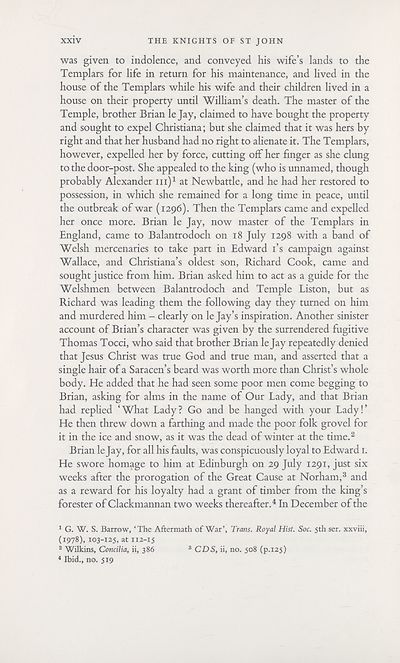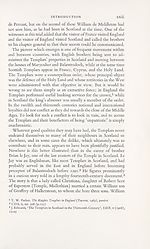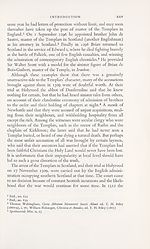Series 4 > Knights of St John of Jerusalem in Scotland
(29) Page xxiv
Download files
Complete book:
Individual page:
Thumbnail gallery: Grid view | List view

xxiv
THE KNIGHTS OF ST JOHN
was given to indolence, and conveyed his wife’s lands to the
Templars for life in return for his maintenance, and lived in the
house of the Templars while his wife and their children lived in a
house on their property until William’s death. The master of the
Temple, brother Brian le Jay, claimed to have bought the property
and sought to expel Christiana; but she claimed that it was hers by
right and that her husband had no right to alienate it. The Templars,
however, expelled her by force, cutting off her finger as she clung
to the door-post. She appealed to the king (who is unnamed, though
probably Alexander in)1 at Newbattle, and he had her restored to
possession, in which she remained for a long time in peace, until
the outbreak of war (1296). Then the Templars came and expelled
her once more. Brian le Jay, now master of the Templars in
England, came to Balantrodoch on 18 July 1298 with a band of
Welsh mercenaries to take part in Edward i’s campaign against
Wallace, and Christiana’s oldest son, Richard Cook, came and
sought justice from him. Brian asked him to act as a guide for the
Welshmen between Balantrodoch and Temple Liston, but as
Richard was leading them the following day they turned on him
and murdered him - clearly on le Jay’s inspiration. Another sinister
account of Brian’s character was given by the surrendered fugitive
Thomas Tocci, who said that brother Brian le Jay repeatedly denied
that Jesus Christ was true God and true man, and asserted that a
single hair of a Saracen’s beard was worth more than Christ’s whole
body. He added that he had seen some poor men come begging to
Brian, asking for alms in the name of Our Lady, and that Brian
had replied ‘What Lady? Go and be hanged with your Lady!’
He then threw down a farthing and made the poor folk grovel for
it in the ice and snow, as it was the dead of winter at the time.2
Brian le Jay, for all his faults, was conspicuously loyal to Edward 1.
He swore homage to him at Edinburgh on 29 July 1291, just six
weeks after the prorogation of the Great Cause at Norham,3 and
as a reward for his loyalty had a grant of timber from the king’s
forester of Clackmannan two weeks thereafter.4 In December of the
1 G. W. S. Barrow, ‘The Aftermath of War’, Trans. Royal Hist. Soc. 5 th ser. xxviii,
(1978), 103-125, at 112-15
2 Wilkins, Concilia, ii, 386 3 CDS, ii, no. 508 (p.125)
4 Ibid., no. 519
THE KNIGHTS OF ST JOHN
was given to indolence, and conveyed his wife’s lands to the
Templars for life in return for his maintenance, and lived in the
house of the Templars while his wife and their children lived in a
house on their property until William’s death. The master of the
Temple, brother Brian le Jay, claimed to have bought the property
and sought to expel Christiana; but she claimed that it was hers by
right and that her husband had no right to alienate it. The Templars,
however, expelled her by force, cutting off her finger as she clung
to the door-post. She appealed to the king (who is unnamed, though
probably Alexander in)1 at Newbattle, and he had her restored to
possession, in which she remained for a long time in peace, until
the outbreak of war (1296). Then the Templars came and expelled
her once more. Brian le Jay, now master of the Templars in
England, came to Balantrodoch on 18 July 1298 with a band of
Welsh mercenaries to take part in Edward i’s campaign against
Wallace, and Christiana’s oldest son, Richard Cook, came and
sought justice from him. Brian asked him to act as a guide for the
Welshmen between Balantrodoch and Temple Liston, but as
Richard was leading them the following day they turned on him
and murdered him - clearly on le Jay’s inspiration. Another sinister
account of Brian’s character was given by the surrendered fugitive
Thomas Tocci, who said that brother Brian le Jay repeatedly denied
that Jesus Christ was true God and true man, and asserted that a
single hair of a Saracen’s beard was worth more than Christ’s whole
body. He added that he had seen some poor men come begging to
Brian, asking for alms in the name of Our Lady, and that Brian
had replied ‘What Lady? Go and be hanged with your Lady!’
He then threw down a farthing and made the poor folk grovel for
it in the ice and snow, as it was the dead of winter at the time.2
Brian le Jay, for all his faults, was conspicuously loyal to Edward 1.
He swore homage to him at Edinburgh on 29 July 1291, just six
weeks after the prorogation of the Great Cause at Norham,3 and
as a reward for his loyalty had a grant of timber from the king’s
forester of Clackmannan two weeks thereafter.4 In December of the
1 G. W. S. Barrow, ‘The Aftermath of War’, Trans. Royal Hist. Soc. 5 th ser. xxviii,
(1978), 103-125, at 112-15
2 Wilkins, Concilia, ii, 386 3 CDS, ii, no. 508 (p.125)
4 Ibid., no. 519
Set display mode to:
![]() Universal Viewer |
Universal Viewer | ![]() Mirador |
Large image | Transcription
Mirador |
Large image | Transcription
Images and transcriptions on this page, including medium image downloads, may be used under the Creative Commons Attribution 4.0 International Licence unless otherwise stated. ![]()
| Scottish History Society volumes > Series 4 > Knights of St John of Jerusalem in Scotland > (29) Page xxiv |
|---|
| Permanent URL | https://digital.nls.uk/126637863 |
|---|
| Description | Over 180 volumes, published by the Scottish History Society, containing original sources on Scotland's history and people. With a wide range of subjects, the books collectively cover all periods from the 12th to 20th centuries, and reflect changing trends in Scottish history. Sources are accompanied by scholarly interpretation, references and bibliographies. Volumes are usually published annually, and more digitised volumes will be added as they become available. |
|---|


